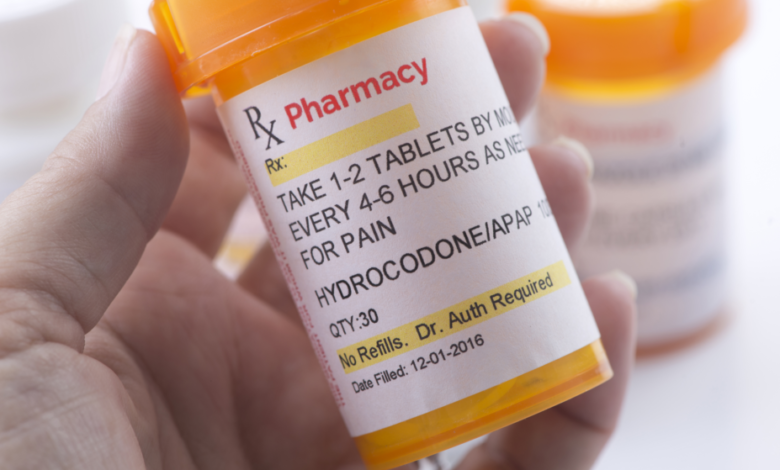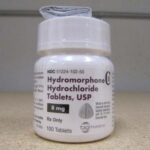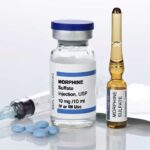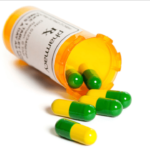Hydrocodone: Uses, Dosage, Side Effects, Abuse, Addiction

Hydrocodone is in a class of medications called opiate (narcotic) analgesics. It works by changing the way the brain and nervous system respond to pain. Hydrocodone is used to relieve severe pain. Hydrocodone is only used to treat people who are expected to need medication to relieve severe pain around-the-clock for a long time and who cannot be treated with other medications or treatments. Hydrocodone extended-release (long-acting) capsules or extended-release tablets should not be used to treat pain that can be controlled by medication that is taken as needed.
This monograph only includes information about the use of hydrocodone alone. If you are taking a hydrocodone combination product, be sure to read information about all the ingredients in the hydrocodone-combination monograph and ask your doctor or pharmacist for more information. The Drug Enforcement Administration (DEA) moved hydrocodone combination products (HCPs) from DEA Schedule III to DEA Schedule II in October 2014.
How quickly does Hydrocodone work?
Hydrocodone onset of action depends on the route of administration:
1. Oral Administration: When hydrocodone is taken orally in tablet or liquid form, it typically takes around 30 to 60 minutes to start working. The drug is absorbed through the gastrointestinal tract and enters the bloodstream before reaching its target receptors in the brain and spinal cord.
2. Intravenous (IV) Injection: In a medical setting, hydrocodone can be administered intravenously, which allows for rapid absorption and immediate onset of action. With IV administration, the effects of hydrocodone are usually felt within a few minutes.
It’s important to note that the onset of pain relief can vary among individuals due to factors such as metabolism, individual response, and the presence of food in the stomach. Additionally, hydrocodone is often combined with other medications, such as acetaminophen, in formulations like Vicodin or Norco, which can affect the onset and duration of its effects.
It’s crucial to use hydrocodone only as prescribed by a healthcare professional and to follow the recommended dosage and instructions. If you have any specific concerns or questions about hydrocodone, it’s best to consult with a healthcare provider.
How should hydrocodone be used?
Hydrocodone comes as an extended-release (long-acting) capsule and an extended-release (long-acting) tablet to take by mouth. The extended-release capsule is usually taken once every 12 hours. The extended-release tablet is usually taken once daily. Take hydrocodone at around the same time(s) every day. Follow the directions on your prescription label carefully, and ask your doctor or pharmacist to explain any part you do not understand. Take hydrocodone exactly as directed by your doctor.
Swallow the extended-release capsules or extended-release tablets one at a time with plenty of water. Swallow each capsule or tablet as soon as you put it in your mouth. Do not presoak, wet, or lick the extended-release tablets before you put them in your mouth.
Your doctor will probably start you on a low dose of hydrocodone and may gradually increase your dose, not more than once every 3 to 7 days if needed to control your pain. After you take hydrocodone for a period of time, your body may become used to the medication. If this happens, your doctor may increase your dose of hydrocodone or may prescribe a different medication to help control your pain. Talk to your doctor about how you are feeling during your treatment with hydrocodone.
Do not stop taking hydrocodone without talking to your doctor. If you suddenly stop taking hydrocodone, you may experience withdrawal symptoms such as restlessness, teary eyes, runny nose, yawning, sweating, chills, hair standing on end, muscle pain, widened pupils (black circles in the middle of the eyes), irritability, anxiety, back or joint pain, weakness, stomach cramps, difficulty falling asleep or staying asleep, nausea, loss of appetite, vomiting, diarrhea, fast breathing, or fast heartbeat. Your doctor will probably decrease your dose gradually.
Other uses for this medicine
This medication may be prescribed for other uses; ask your doctor or pharmacist for more information.
What side effects can this medication cause?
Hydrocodone may cause side effects. Tell your doctor if any of these symptoms are severe or do not go away:
- stomach pain
- dry mouth
- tiredness
- headache
- back pain
- muscle tightening
- difficult, frequent, or painful urination
- ringing in the ears
- difficulty falling asleep or staying asleep
- foot, leg, or ankle swelling
- uncontrollable shaking of a part of the body
Some side effects can be serious. If you experience any of these symptoms call your doctor immediately or get emergency medical treatment:
- chest pain
- agitation, hallucinations (seeing things or hearing voices that do not exist), fever, sweating, confusion, fast heartbeat, shivering, severe muscle stiffness or twitching, loss of coordination, nausea, vomiting, or diarrhea
- nausea, vomiting, loss of appetite, weakness, or dizziness
- inability to get or keep an erection
- irregular menstruation
- decreased sexual desire
- swelling of your eyes, face, lips, tongue, or throat
- hoarseness
- changes in heartbeat
- hives
- itching
- difficulty swallowing or breathing
Hydrocodone may cause other side effects. Call your doctor if you have any unusual problems while taking this medication.
Hydrocodone Safety Information
Hydrocodone can be habit forming, especially with prolonged use. Take hydrocodone exactly as directed. Do not take more of it, take it more often, or take it in a different way than directed by your doctor. While taking hydrocodone, discuss with your healthcare provider your pain treatment goals, length of treatment, and other ways to manage your pain. Tell your doctor if you or anyone in your family drinks or has ever drunk large amounts of alcohol, uses or has ever used street drugs, or has overused prescription medications, or has had an overdose, or if you have or have ever had depression or another mental illness. There is a greater risk that you will overuse hydrocodone if you have or have ever had any of these conditions. Talk to your health care provider immediately and ask for guidance if you think that you have an opioid addiction or call the U.S. Substance Abuse and Mental Health Services Administration (SAMHSA) National Helpline at 1-800-662-HELP.
Do not allow anyone else to take your medication. Hydrocodone may harm or cause death to other people who take your medication, especially children. Keep hydrocodone in a safe place so that no one else can take it accidentally or on purpose. Be especially careful to keep hydrocodone out of the reach of children. Keep track of how many capsules or tablets are left so you will know if any medication is missing.
Hydrocodone may cause slowed or stopped breathing, especially during the first 24 to 72 hours of your treatment and any time your dose is increased. Your doctor will monitor you carefully during your treatment and adjust your dose to control your pain and decrease the risk that you will experience serious breathing problems. Tell your doctor if you have or have ever had slowed breathing or asthma. Your doctor will probably tell you not to take hydrocodone. Also tell your doctor if you have or have ever had lung disease such as chronic obstructive pulmonary disease (COPD; a group of diseases that affect the lungs and airways), a head injury, a brain tumor, or any condition that increases the amount of pressure in your brain. The risk that you will develop breathing problems may be higher if you are an older adult or are weakened or malnourished due to disease. If you experience any of the following symptoms, call your doctor immediately or get emergency medical treatment: slowed breathing, long pauses between breaths, or shortness of breath.
Taking certain medications or stopping treatment with certain other medications while you are taking hydrocodone may increase the risk that you will experience breathing problems, sedation, coma, or other serious, life-threatening side effects. Tell your doctor if you are taking, plan to take or plan to stop taking any of the following medications: certain antifungal medications including itraconazole (Onmel, Sporanox), ketoconazole (Extina, Nizoral, Xolegel), and voriconazole (Vfend); benzodiazepines such as alprazolam (Xanax), chlordiazepoxide (Librium), clonazepam (Klonopin), diazepam (Diastat, Valium), estazolam, flurazepam, lorazepam (Ativan), oxazepam, temazepam (Restoril), and triazolam (Halcion); carbamazepine (Carbatrol, Epitol, Equetro, Tegretol, others); cimetidine; clarithromycin (Biaxin, in Prevpac); erythromycin (E.E.S., Erythromycin, others); other narcotic pain medications; medications for mental illness or nausea; certain medications for human immunodeficiency virus (HIV) including ritonavir (Norvir, in Kaletra, in Viekira Pak); muscle relaxants; phenytoin (Dilantin, Phenytek); rifampin (Rifadin, Rimactane, in Rifamate, in Rifater); sedatives; sleeping pills; or tranquilizers. If you take hydrocodone with any of these medications and you develop any of the following symptoms, call your doctor immediately or seek emergency medical care: unusual dizziness, lightheadedness, extreme sleepiness, slowed or difficult breathing, or unresponsiveness. Be sure that your caregiver or family members know which symptoms may be serious so they can call the doctor or emergency medical care if you are unable to seek treatment on your own.
Drinking alcohol, taking prescription or nonprescription medications that contain alcohol, or using street drugs during your treatment with hydrocodone increases the risk that you will experience these serious, life-threatening side effects. Do not drink alcohol, take prescription or nonprescription medications that contain alcohol, or use street drugs during your treatment.
Swallow hydrocodone extended-release capsules or extended-release tablets whole; do not chew, break, divide, crush, or dissolve them. Hydrocodone extended-release capsules and extended-release tablets are difficult to crush, break or dissolve. If you swallow broken, chewed, or crushed extended-release capsules or extended-release tablets, you may receive too much hydrocodone at once. This may cause serious problems, including overdose and death.
Tell your doctor if you are pregnant or plan to become pregnant. If you take hydrocodone regularly during your pregnancy, your baby may experience life-threatening withdrawal symptoms after birth. Tell your baby’s doctor right away if your baby experiences any of the following symptoms: irritability, hyperactivity, abnormal sleep, high-pitched cry, uncontrollable shaking of a part of the body, vomiting, diarrhea, or failure to gain weight.
Your doctor or pharmacist will give you the manufacturer’s patient information sheet (Medication Guide) when you begin treatment with hydrocodone and each time you refill your prescription. Read the information carefully and ask your doctor or pharmacist if you have any questions. You can also visit the Food and Drug Administration (FDA) website.
How to overcome hydrocodone abuse
Overcoming hydrocodone abuse can be a challenging process, but with determination and support, it is possible to regain control of your life. Here are some steps you can take to overcome hydrocodone abuse:
1. Acknowledge the problem: Recognize and accept that you have a problem with hydrocodone abuse. Admitting the issue is the first step toward recovery.
2. Seek professional help: Consult a healthcare professional, such as a doctor or addiction specialist, who can provide guidance and support. They can assess your situation, provide appropriate treatment options, and monitor your progress.
3. Create a support network: Surround yourself with a strong support system, including family, friends, or support groups. They can offer encouragement, understanding, and accountability throughout your recovery journey.
4. Develop a treatment plan: Work with your healthcare professional to create a personalized treatment plan. This may include a combination of medication, therapy (individual or group), and behavioral interventions to address both the physical and psychological aspects of addiction.
5. Detoxification: If you have developed a physical dependence on hydrocodone, a medically supervised detoxification process may be necessary. This helps manage withdrawal symptoms and ensures your safety during the detox phase.
6. Address underlying issues: Explore the underlying reasons that contributed to your hydrocodone abuse. This could involve identifying and addressing any co-occurring mental health conditions, past trauma, or stressors that may have played a role in your addiction.
7. Learn healthy coping mechanisms: Develop healthier coping strategies to deal with stress, pain, or emotional triggers. This might include exercise, mindfulness techniques, hobbies, or engaging in activities that promote overall well-being.
8. Modify your environment: Remove any hydrocodone pills or triggers from your living space. Avoid situations or individuals that may tempt you to relapse. Create a clean and supportive environment that encourages your recovery.
9. Stay committed and patient: Recovery takes time, and setbacks may occur along the way. Remain committed to your treatment plan and understand that progress may not always be linear. Be patient with yourself and celebrate even small victories.
10. Follow-up care and aftercare: After completing a formal treatment program, ongoing support is crucial. Attend follow-up appointments, therapy sessions, or support group meetings as recommended. Stay connected with your support network to maintain long-term recovery.
Remember, overcoming hydrocodone abuse is a process that requires effort, dedication, and a willingness to make positive changes in your life. Seek professional help and lean on your support network to increase your chances of success.




